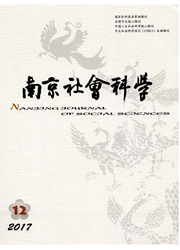

 中文摘要:
中文摘要:
马克思将商品范畴置于《资本论》的开端,按照恩格斯关于“术语革命”的论断,正是在商品概念的内涵上,马克思开始与古典经济学发生了真正的断裂。由于关注商品交换这一现象层面,斯密对商品的分析陷入了两种价值论的矛盾之中,无法达到对商品自身“二重性”的自觉认识。直至马克思以二重性观念重新剖析作为资本主义生产方式细胞形式的商品及其所包含的二重形式的劳动,才实现了从质和量的对立统一中把握商品概念,揭示出商品中承载着的人与人之间特定的社会交往方式。《资本论》中的商品论凸显的是经济术语的道义伦理维度,商品范畴实质上表征了人在经济社会中所处的非本真、异化的生存状态。马克思的商品分析,深入到了现代人的存在方式这一社会历史的本质层面,这是对马克思主义哲学的理论动机即寻求人类自由解放的充分具体化。
 英文摘要:
英文摘要:
Marx' s investigation into Das Kapital begins with analysis of a commodity. Accord- ing to the conclusion of a revolution in the technical terms by Engels, ruptures between Marx and the classical economists begin with the connotation of commodity. Owing to Adam Smith' s attention only at the economic phenomenon of commodity exchange, his analysis of commodities into the contradic- tion of two kinds of theory of value. After a new definition which Marx established by concept of du- alism, commodities as cells form of capitalist mode of production and the twofold character of the la- bour embodied in commodities regain combination of quality and quantity. Marx reveals the special social relations which we have been ignored in commodities. Actually theory of commodity in Das Kapital highlight a dimension of deontology ethics within Marx' s economic terms. Real connotation of commodities express an idea that people are suffering from alienation in life. Marx' s analysis of commodities penetrate into the essence of modern society. It embodies theoretical motive of Marxist Philosophy which struggle for freedom and liberation of mankind. The concept of commodity contains the ontology of Marxism, this manifest profound philosophical implications of commodities at the same time.
 同期刊论文项目
同期刊论文项目
 同项目期刊论文
同项目期刊论文
 期刊信息
期刊信息
